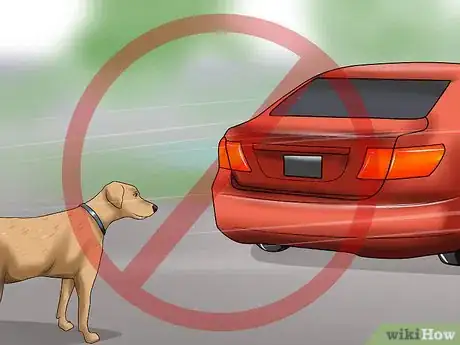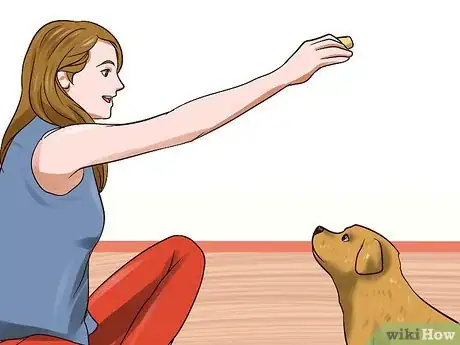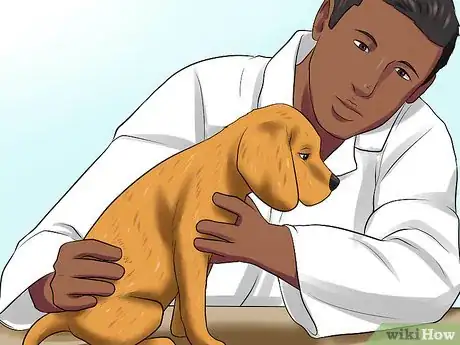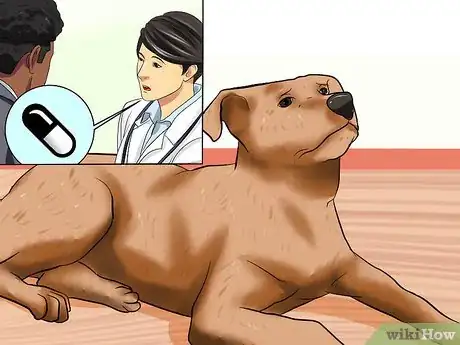This article was co-authored by Pippa Elliott, MRCVS. Dr. Elliott, BVMS, MRCVS is a veterinarian with over 30 years of experience in veterinary surgery and companion animal practice. She graduated from the University of Glasgow in 1987 with a degree in veterinary medicine and surgery. She has worked at the same animal clinic in her hometown for over 20 years.
This article has been viewed 38,171 times.
There are certain circumstances that might make it where you can't care for your dog anymore. This might mean you have to surrender your dog, which means he will have to go to another home. This can be heart-breaking for you and traumatic for your dog. If you think you can no longer handle your dog, you can try to find help with dealing with your dog or look into proper places to rehome your dog.
Steps
Finding Your Dog a New Home
-
1Research a shelter. If you want to give your pet to a shelter, research the right one for your dog. Most shelters are overrun with pets, which means that they have no room for new pets. Make sure the shelter you are looking into has a no-kill policy. Shelters that have kill policies typically can only give new pets seven days to find a new home before they are killed.
- There are other shelters that have a policy where every dog over four years old will be killed.
-
2Check out the rescue's website. Most rescue organizations have a list of requirements that have to be met before they can accept a dog. This includes making sure you dog has certain vaccinations. Many organizations also require your dog to be fixed.
- If your dog has not been fixed, there are some charities or animal organizations that may be able to help or offer low cost options.
- You should also ask your vet for a copy of your dog's medical history. This will give the rescue organization a full background on your dog. Even if your dog is and has always been healthy, any potential new owner will need to see that your dog is up to date on his shots.[1]
Advertisement -
3Look into a breeder. If the dog you can no longer handle is a purebred, you may want to look into a breeder that is specific for that breed. You can go back to the breeder that you bought the dog from or ask your vet about other breeders in the area for that kind of dog.
- You may also be able to look specifically for a breeder rescue society. These societies help arrange foster homes for specific pedigreed dogs and typically have a higher success rate than normal shelters.
-
4Check with the original shelter. If you got your dog from a shelter to begin with, you may be able to return your dog to that shelter. Sometimes this is written into the shelter contract when you get the dog originally. Look back at the paperwork you have on them or call the shelter to ask.
-
5Never dump your dog. If you cannot keep the dog and have no other options, do not dump your dogs on the side of the road. This is not good for your dog or the animal population. Also never dump your dog at a shelter either. Just call the shelter and explain your circumstances. They may take him in if you explain your circumstances.
- Some shelters do charge fees to take ward the dogs.[2]
-
6Be cautious about another home. If you are looking into giving away your dog to a good home, make sure you know the person you are giving your dog to. Instead of giving him away on the side of the road, try to give the dog to someone you know or a friend of a friend that you know will give him a good home.
- You don't know the intention of some of the people who may be adopting a dog off the side of the road. The new people may want your dog for dog fighting or some other bad purpose.
-
7Surrender the dog. Once you have decided a shelter to surrender your dog to, you need to find out if you need to fill out any necessary paperwork required by the shelter. These forms act as the official surrender documentation that legitimizes the ownership transfer process. You may also have to pay a fee to help with housing and rehoming costs. Once the forms are filled out and you have the fees, you should take your dog to the shelter and hand it all over.
- The forms are also used by the shelter or rescue to get to know your dog, so they can provide the best care while he is there as well as help find him a good home.[3]
- Breeders may have a similar form or paperwork that is required for official surrender. Ask whatever facility you found to surrender your dog about their specific requirements.
Trying to Find Other Options
-
1Work on bad behavior. If you want to rehome your dog because of bad behavior, there are other options you can look into before you get rid of your dog. Before you give away your dog, look into a pet behaviorist. Ask your vet to give you a referral for a trained and qualified behaviorist.
- Typically, dogs that behave badly do so because they are anxious, they lack training, or they don't really know what you want them to do. A behaviorist can come into your home and help you figure out the root of your dog's problem and how you can help him change his behavior and make him easier to live with.[4]
-
2Talk to your new landlord. If you are moving to another house that has a no pets policy, try to talk to landlord to show what a good dog yours is. Consider putting together a portfolio that shows how well behaved and nice your dog is. Put pictures of him with your family to show that he is sociable and well behaved.
- Also put together all his vet records that shows he is healthy and up to date on his vaccines and other shots.
- You can even have someone who knows your dog to write a canine character reference that may sway your landlord's mind. [5]
-
3Apply for dog welfare. If you are thinking of rehoming your dog because of financial problems, there are different charities to help you. They may be able to help you with vet bills or food bills. There are also dog food banks that may be able to give you food for your dog if you can't afford it and your dog is in genuine need.
- If you need help with vet bills, try the Pet Fund, which is a charity that helps cover dog costs.
- You can also take out a credit card specifically for dog healthcare, such as Care Credit. This could help your dog's treatment be easier to manage over time.
- The Humane Society also has an extensive list of organizations that can help you with your dog costs.[6] [7]
-
4Have your dog checked. There may be a medical reason for why your dog is irritated or aggravating to you. Take your dog to the vet to see if he is suffering from a medical problem that might be causing problems.
- For example, health problems may cause your dog to urinate more often or soil in the house.
-
5Look into emigration assistance. If you are considering getting rid of your dog because you are emigrating to another country, there are some things that might help you. Many countries have Pet Travel systems that can help your move your dog into their country. This requires you to provide certain documents that prove he is free from disease before he can enter the country.
- You can also talk to your vet about exporting your pet and who you can contact in certain embassies of other countries for pet exporting details.[8]
-
6Consider options for a sick dog. If you dog is sick, most rescue organizations and shelters will not take him. In these cases, you will have to look for financial assistance other places or discuss other options with your vet. If your dog is very sick, he is in pain, or his life expectancy is not long, it may be more humane to consider putting him down.
- You may also be able to ask your vet for a cheaper treatment option for your dog.[9]
References
- ↑ https://www.animalhumanesociety.org/services/surrender-appointment-process
- ↑ http://www.humanesociety.org/animals/resources/tips/trouble_affording_pet.html
- ↑ https://www.animalhumanesociety.org/services/surrender-appointment-process
- ↑ http://www.allbreedrescuevt.com/info/display?PageID=14095
- ↑ http://www.allbreedrescuevt.com/info/display?PageID=14095
- ↑ http://www.humanesociety.org/animals/resources/tips/trouble_affording_pet.html
- ↑ http://thepetfund.com/
- ↑ http://www.allbreedrescuevt.com/info/display?PageID=14095
- ↑ http://www.allbreedrescuevt.com/info/display?PageID=14095
About This Article
To surrender a dog, start by asking people you know if they can take your pet, or know of someone who wants a dog. Try to avoid giving your dog to a stranger, since you can't be sure they'll give your dog a good home. Alternatively, contact no-kill shelters or rescue organizations to see if they can accept new animals. If you adopted your dog from a shelter, contact them to see if you can surrender it back to them based on your original agreement. For advice from our Veterinary co-author on how to explore options that may allow you to keep your dog, read on!





































































